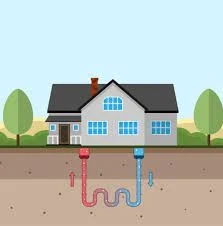Introduction
In the quest for sustainable and efficient heating and cooling solutions, residential geothermal systems have emerged as a game-changer. As we navigate the challenges of climate change, homeowners are increasingly turning to geothermal technology to not only reduce their carbon footprint but also enjoy cost-effective and reliable temperature control within their homes. In this guest post, we'll delve into the world of residential geothermal heating and cooling, exploring its mechanisms, benefits, and the transformative impact it can have on the way we experience home comfort.
Understanding Residential Geothermal Systems
Harnessing Earth's Constant Temperature
Residential geothermal systems leverage the stable temperature of the Earth's subsurface to provide a consistent source of heating and cooling. Unlike traditional HVAC systems, which rely on external air temperatures, geothermal systems tap into the Earth's steady thermal energy, offering a more reliable and energy-efficient solution.
Components of a Geothermal System
A typical residential geothermal system comprises a heat pump, a ground loop, and a distribution system. This section breaks down each component, elucidating how they work in harmony to regulate indoor temperatures.
Advantages of Residential Geothermal Systems
Energy Efficiency Beyond Compare
Geothermal systems boast unparalleled energy efficiency, providing substantial cost savings over time. By relying on the Earth's natural temperature, these systems reduce the need for excessive energy consumption, making them a sustainable and economically viable choice.
Year-Round Comfort
One of the unique features of geothermal systems is their ability to both heat and cool homes efficiently. This versatility ensures year-round comfort, eliminating the need for separate heating and cooling systems.
Installation and Maintenance Considerations
Professional Installation Process
Installing a residential geothermal system requires expertise to ensure optimal performance. This part outlines the key steps involved in the installation process and highlights the importance of professional assistance.
Low Maintenance Requirements
Compared to traditional HVAC systems, geothermal systems have minimal maintenance needs. Understanding these requirements empowers homeowners to enjoy long-lasting comfort without the hassle of frequent repairs.
Financial Incentives and Return on Investment
Government Rebates and Incentives
Governments recognize the importance of transitioning to sustainable energy solutions. Here, we explore the various rebates and incentives available to homeowners investing in geothermal systems.
Long-Term Savings
While the initial investment in a geothermal system may seem significant, the long-term savings in energy costs and potential increases in property value make it a wise financial decision for homeowners.
Environmental Impact of Residential Geothermal Systems
Reducing Carbon Footprint
Geothermal systems contribute significantly to reducing greenhouse gas emissions. This section delves into the environmental benefits of choosing geothermal for residential heating and cooling.
Eco-Friendly Refrigerants
Unlike traditional air conditioners, geothermal systems utilize eco-friendly refrigerants, minimizing their impact on the environment and contributing to a greener future.
Addressing Common Myths about Geothermal Systems
Space Limitations and Aesthetic Concerns
Some homeowners hesitate to embrace geothermal due to perceived space limitations and concerns about the system's appearance. We debunk these myths and shed light on the adaptability of geothermal systems to various property types.
Noise Levels and Disruption
Concerns about noise and disruption during operation are common. This section clarifies misconceptions and emphasizes the quiet and unobtrusive nature of well-designed geothermal systems.
Conclusion
Residential geothermal heating and cooling represent a sustainable and forward-thinking approach to home comfort. As homeowners increasingly seek environmentally friendly alternatives without compromising on efficiency, geothermal systems stand out as a beacon of innovation. By understanding the mechanics, benefits, and future developments in this technology, homeowners can make informed choices that contribute to both personal comfort and global environmental well-being.


